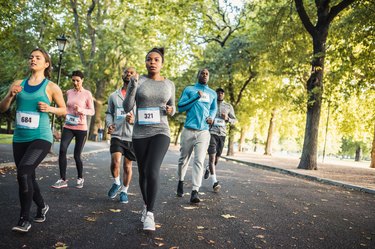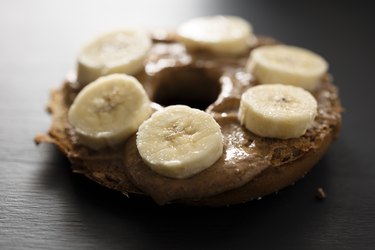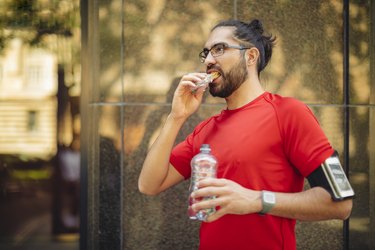
If you're gearing up to run your first marathon, you're probably not new to running (and if you are, you may want to tackle a 5K first). The 26.2-mile race is no small feat, and the average marathon time varies according to factors like age, sex and course terrain (more on that below).
How long do marathons take? Overall, marathon statistics show the average time to finish a marathon is 4 hours, 32 minutes and 49 seconds. But don't get hung up on your finish time, especially during your first race. For most runners, simply crossing the finish line is an accomplishment worth celebrating.
Video of the Day
Video of the Day
Before you schedule your marathon, consider the time commitment necessary to complete a proper training plan and set some realistic, attainable goals.
A Note on Language
Here at LIVESTRONG.com, we carefully consider language surrounding sex and gender. We typically avoid language that implies a sex or gender binary in favor of neutral language, such as "assigned female at birth" (AFAB) and "assigned male at birth" (AMAB). We use "gender" when referring to a person's social identity; we use "sex" when referring to biological characteristics.
Most running races still categorize participants as men or women, so we're using those terms where they are used by primary sources throughout this article.
How Long Is a Marathon?
The marathon distance in miles is a whopping 26.2 miles (or 42 kilometers). This race is certainly one of the lengthier options on the average runner's bucket list. After you've tackled a 5K, 10K and half-marathon, the marathon is typically the race to follow.
But long-distance running doesn't stop there: Both the 50K (31.1 miles) and 100K (63.8 miles) races, called ultramarathons, make appearances on many runners' calendars, too.
The marathon is unique, however, as its origins date back to ancient Greece, according to the Tufts University Perseus Digital Library. The legend begins in the 5th century B.C.E. when the Persian army invaded Greece in the city of Marathon, about 26 miles away from Athens.
Once Greece won the battle, a messenger named Phidippides (or Pheidippides) ran the 26 miles from Marathon to Athens to announce the Greek victory and died right after his arrival, according to the legend. (But don't let this discourage you from running your own 26.2!)
The additional 385 yards or 0.2 miles were tacked on for the 1908 London Olympics so the race could finish directly in front of the British royal family's viewing box in White City Stadium, according to The Olympic Marathon: The History and Drama of Sport's Most Challenging Event.
Average Time to Finish a Marathon
For its 2019 report on running — which, as of March 2024 is currently the most recent of its kind — RunRepeat.com used 107.9 million race results from more than 70,000 events from 1986 to 2018. Based on their analysis, done in collaboration with the International Association of Athletics Federations (IAAF), the average marathon time, regardless of age or sex, was 4:32:49.
Certain races are famously harder than others or may attract more beginner runners. According to data from the 2019 report, the average worldwide marathon finish time has generally gotten slower since 1986, when the average marathon finish time was 3:52:35.
Average Marathon Time by Age and Sex
If you're wondering how many hours should a marathon take, there's no singular correct answer, as everyone has different fitness and experience levels. But we looked at average times to give you an idea of how long it typically takes people to cover 26.2 miles.
While races have traditionally attracted more male than female runners, there were more female than male runners in 2018, according to RunRepeat.com. Male runners experienced a 3 percent slowdown on average each year since 2001, when their average marathon time was 4:15:13.
Among female runners, marathon finishing times slowed from 1986 to 2001, when the average for female runners was 4:56:18. But they've since sped up by 1.3 percent on average each year.
In 2018, the average marathon finish time for male runners was just under 4:30, while female runners clocked in closer to 5:00, according to RunRepeat.com.
Perhaps unsurprisingly, the average time it takes to run a marathon increases as you get older. But what's maybe a bit more unexpected is the average age of marathon runners: Since 1986, it has increased from 38 to 40. The average marathon finish time for runners between 50 and 60 years old is 4:34; it's 5:40 for those over 70.
U.S. National Average Marathon Time by Age
Age | Finish Time |
|---|---|
0 to 20 | 4:34:00 |
20 to 30 | 4:30:00 |
30 to 40 | 4:24:00 |
40 to 50 | 4:24:00 |
50 to 60 | 4:34:00 |
60 to 70 | 4:50:00 |
70+ | 5:40:00 |
Average Marathon Times for Men by Age
Researchers at Pace Calculator analyzed race results from over 21,000 different U.S. marathoners who ran in 2010, which is the most recent data available of this kind. Here's what they found for men:
Age | Time |
|---|---|
0-15 | 4:53:53 |
16-19 | 4:16:19 |
20-24 | 4:01:55 |
25-29 | 4:06:43 |
30–34 | 4:07:35 |
35–39 | 4:10:39 |
40–44 | 4:09:36 |
45–49 | 4:11:32 |
50–54 | 4:19:49 |
55–59 | 4:31:10 |
60–64 | 4:53:26 |
65–99 | 5:06:59 |
Average Marathon Times for Women by Age
Researchers at Pace Calculator analyzed race results from over 21,000 different U.S. marathoners who ran in 2010, which is the most recent data available of this kind. Here's what they found for women:
Age | Time |
|---|---|
0-14 | 6:04:11 |
15-19 | 4:50:23 |
20-24 | 4:28:59 |
25-29 | 4:27:14 |
30-34 | 4:28:07 |
35-39 | 4:33:47 |
40-44 | 4:34:13 |
45-49 | 4:39:02 |
50-54 | 4:55:37 |
55-59 | 5:00:52 |
60-64 | 5:12:26 |
65-99 | 5:20:57 |
Fastest Marathon Finish Times
The fastest time ever for a marathon on a record-eligible course is 2:00:35, recorded by Kenyan runner Kelvin Kiptum in the 2023 Chicago Marathon, according to World Athletics. He was killed in a car crash just a few months later.
Kenyan runner Eliud Kipchchoge broke the two-hour mark at the October 2019 INEOS 1:59 Challenge, but these results don't officially count, as competition rules for pacing and fluids weren't followed. Still, runners everywhere celebrated the accomplishment.
Ethiopia's Tigst Assefa ran a 2:11:53 at the 2023 Berlin Marathon, the fastest marathon time recorded for a female runner, according to World Athletics.
World Record Marathon Times
The current marathon world records — set in 2023 — for the marathon are:
- Male: Kelvin Kiptum at 2:00:35
- Female: Tigst Assefa at 2:11:53
Factors Affecting Your Marathon Time
1. Age
According to the charts above, those younger than 30 and older than 60 tend to have the slowest marathon times while those between 30 and 50 tend to have the fastest times.
2. Fitness Level
Someone who just started running usually doesn't have the same fitness level as someone who has been running for 30 years. It takes a lot of time and consistent training to be able to run a fast marathon.
3. Race Course
Marathon courses can have a variety of terrain, including downhill, uphill, flat or a combination of all three. Downhill and flat terrain tend to yield faster results, while uphill terrain is typically harder and slower to run on. However, it's a good idea to know the terrain of your race so you can do your best to train on it.
4. Running Experience
If you're running your first marathon, you may be slower than someone running their fifth simply due to your lack of experience. The more marathons you run, the more dialed in your training and fueling become, which can lead to faster times. During your first marathon, you may just want to see if you can complete the distance with no time expectations.
5. Weather and Elevation
If you're used to running in sunny, warm temps and your marathon ends up being cold and rainy (or vice versa), this could slow you down. Elevation plays a part, too. Training at elevation but running your race at sea level may result in a faster time, while training at sea level but running your race at elevation may result in a slower time. If you can, vary the temperatures and elevation you run at to be prepared for your race.
Training for Your First Marathon
While you can probably slide by with only a few quick weeks of training for a 5K or 10K distance, you'll want to devote a little more time to marathon prep. Training for a marathon requires building up your mileage slowly to ensure you stay injury-free both before and after the event.
How many months does it take to train for a marathon? While it depends on your current average mileage, you'll want to begin training for your marathon a few months before the big race. Most training plans will require about three to four days of running each week with a long run scheduled for the weekend. Each week, add about 10 percent more mileage to your long run to prevent injury, according to a September 2014 study in the Journal of Orthopaedic & Sports Physical Therapy.
Most plans also encourage varying your pace with tempo and speed runs. Speed workouts are typically performed on a track and involve running sprint intervals of anywhere from 200 to 1,600 meters. Tempo runs involve running a little faster than your average long-distance pace. These workouts make for higher-intensity training days, so limit them to once or twice per week.
Your non-running days will likely be filled with strength-training exercise. As a runner, you may already be doing your squats and lunges in the weight room, but building your core and upper body is just as important. Exercises like shoulder presses and push-ups can help you maintain good posture and fight fatigue as your runs get longer.
But it's important to build in time for your body to recover, too. Make sure you're foam rolling, hydrating, replenishing with carbs and protein and getting plenty of sleep throughout marathon training, but especially in the 24 to 48 hours after a long run or a high-intensity workout.
If Running Your First Marathon Feels Daunting, Start Here
- RunRepeat.com: "The State of Running 2019"
- INEOS 1:59 Challenge: "History Made 1:59:40.2"
- Tufts University Perseus Digital Library: "Frequently Asked Questions about the Ancient Olympic Games"
- World Athletics: "World Records"
- Journal of Orthopaedic and Sports Physical Therapy: "Running: How to Safely Increase Your Mileage"
- David E. Martin: "The Olympic Marathon: The History and Drama of Sport's Most Challenging Event"
- Pace Calculator: "How Does My Marathon Pace Compare To Others?"




